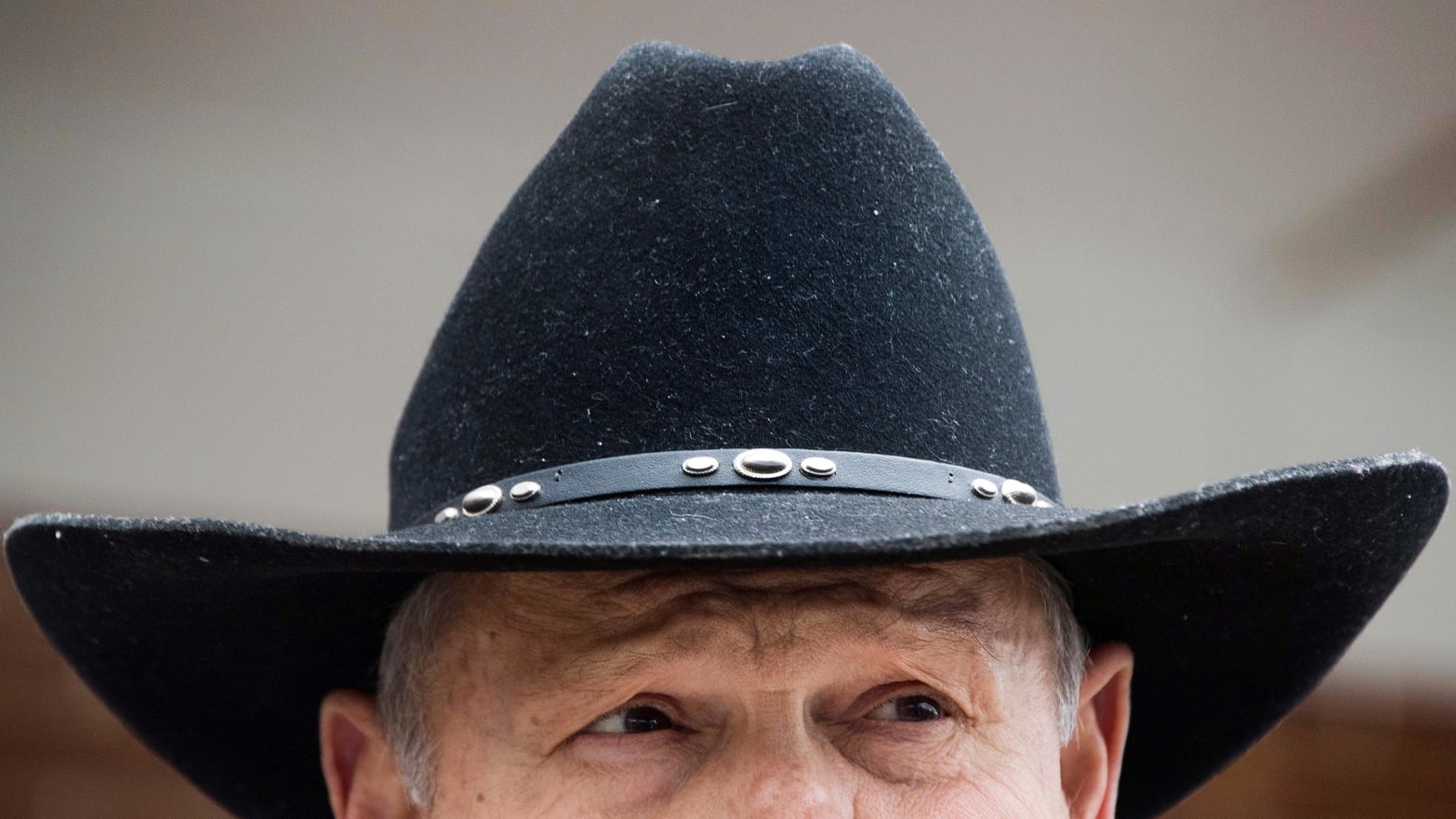Virtually every aspect of Doug Jones’ victory over Roy Moore on Tuesday has already been studied, quantified, and analyzed. But as a former speechwriter and current sometime comedy writer, I couldn’t help but notice an element of the campaign that’s gone overlooked: Jones’ deft use of political rhetoric.
There’s one line in particular I can’t stop thinking about. It was a week before Election Day. The GOP base was beginning to come home. With polls tightening, Jones reminded voters of the time Moore had pulled out a pistol at one of his events. “I’m a supporter of the Second Amendment,” Jones declared. “When you see me with a gun, folks, I’ll be climbing in and out of a deer stand or a turkey blind, not prancing around on a stage in a cowboy suit.”
“Prancing around on a stage in a cowboy suit.” At first it looks like a standard, if slightly harsh, political insult, one of the gazillion interchangeable jabs thrown during a campaign. But parse that phrase closely, and you realize it’s a body blow – not just to Moore, but to Donald Trump, Steve Bannon, and the politics they champion.
Nearly everything Trump does comes with a single, unspoken assertion: I’m a Real Man. It’s not about gender or chromosomes. For Trump, masculinity is wrapped up in a kind of Archie Bunker nostalgia for days when, in the words of the All in the Family Theme Song, girls were girls and men were men. He waxes poetic about the days when NFL players could freely concuss each other. One of his go-to insults for male rivals, from Bob Corker to Kim Jong Un, is “short.” Before he became a politician, he bragged about sexual exploits (and assaults) to demonstrate virility. For Trump, life is an endless series of chances to assert alpha-male status.
And every campaign is a fight against, to borrow one of the alt-right’s favorite slurs, a “beta”—that is, a weakling. As far as Trump and Bannon are concerned, the culture war of 2017 isn’t about abortion or gay marriage. It’s a battle between real men on one side, and effete, sensitive men (Obama) and nasty women (Hillary) on the other.
It’s a retrograde worldview – but also a surprisingly effective campaign tactic. Just look at what happened to Marco Rubio during the 2016 primaries. After being dubbed “Little Marco” in Trump’s tweets and speeches, he tried to give as good as he was getting. “You know what they say about men with small hands …” he jeered in one of his speeches.
Here’s the thing about trying to out-Donald the Donald. It never works. “I guarantee you there’s no problem,” our now-president fired back during a debate, in reference to, well, a part of his anatomy that was definitely not his hands. As they say, you shouldn’t mud-wrestle with a pig, because you both get dirty and the pig likes it. As they also say, you shouldn’t turn a presidential debate into a literal dick-measuring contest.
But how else can you stand up to a bully obsessed with a cave-dweller’s notion of manhood? How do you punch back against these insults without validating the worldview behind them?
Enter Doug Jones. If there’s one person on Earth whose view of gender is less enlightened than Donald Trump’s, it’s Roy Moore. And like the president, Moore loves playing the tough guy. Hence the gun at the rally. Hence the ten-gallon hat. Hence the decision, however questionable, to ride a horse to his polling place on Election Day.
Jones could have gone the Rubio route and tried to prove he was the alpha of the race. Roy Moore pulls out a pistol? Doug Jones pulls out a shotgun! Roy Moore rides on horseback? Doug Jones rides bareback! And so on, and so on. But instead of fighting on the culture warrior’s turf, Jones turned to ridicule.
“Prancing around on a stage in cowboy suit.”
Look at the word choice in that sentence. Not “walking” or “marching,” but “prancing.” Not at a rally, but “on a stage.” Not dressed like a cowboy, but “in a cowboy suit.” These were precise, cutting words. They didn’t just make fun of his opponent. They went straight at the central conceit of his public persona – his toughness. Words like “prancing” and “cowboy suit” suggest the opposite of masculinity. Where Roy Moore presented himself as an alpha male, Doug Jones exposed him as a kind of right-wing cabaret act.
I suspect Jones’ words had even more impact because he spoke them in Alabama, a state where cultural-war politics can easily thrive. To his credit, Jones never turned the campaign into a test of manliness. He never called his opponent a sissy. But after hearing him, any voter concerned about sissy-ness would think twice about Roy Moore.
Diction is not the reason Alabama is sending a Democrat to the Senate. But even if rhetoric made a difference only on the margins, it made a difference – the race came down to about 21,000 votes.
And progressives across the country should take notice. No, most 2018 races won’t feature an (alleged) child molester. But in the age of Trump and Bannon, plenty of them will feature ersatz tough-guys eager to turn politics into a pissing contest. By making his opponent look ridiculous, Doug Jones reminded us that Democrats don’t have to play that game to win elections. With carefully-chosen words, and a healthy appreciation for the power of mockery, they can corral the pigs without getting mud on their hands.

